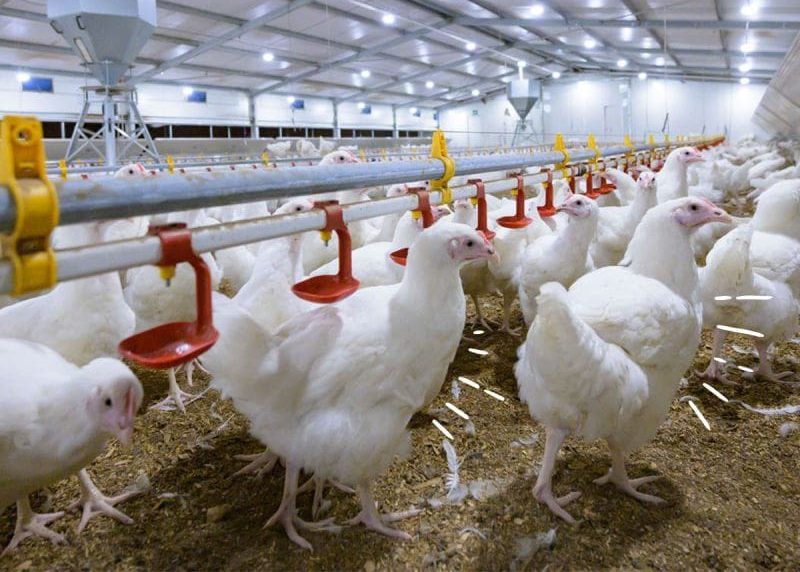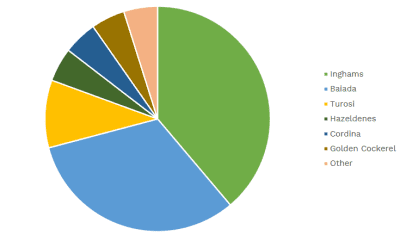
A MANDATORY code of conduct could be adopted to address the monopsony power Australian chicken-meat processors have over producers, according to a final report released this week by the National Farmers Federation.
Entitled Exploring the potential for a Code of Conduct to increase market transparency and competition in Australian poultry meat supply chains, the report was funded by the Federal Department of Agriculture, Fisheries and Forestry.
It was one of several DAFF-funded projects designed to examine options to increase competition and market transparency in Australia’s perishable agriculture goods (PAG) industries.
Chicken-meat producers account for around 25 percent of Australia’s feedgrain use, as do both the feedlot and dairy sectors.
According to a 2018 report by consultant John Spragg, the chicken-meat sector used 3.3 million tonnes of grain annually.
In its projections, an Australian Export Grains Innovation Centre report forecast that figure would life to to 4.3Mt by 2030, behind only the feedlot sector in domestic feedgrain use.

Figure 1: The NFF report highlights a concentration of market-value share in poultry-processing companies (FY20) through this graphic. Source: Citi, Australian Financial Review
Grievances aired
NFF said the findings of its report closely align with those of the Australian Competition and Consumer Commission’s 2020 PAG Inquiry.
“Both reports have identified that practices occurring in the supply chain are causing economic harm,” the report said.
“These practices’ presence and ongoing use demonstrate real issues within the Australian poultry meat supply chain.
“The Australian Government should act to address these economic harms.”
Grievances aired by growers include:
- No alternate processor in their region;
- Little to no ability to compare price offerings between processors when there is more than one in a single area;
- A lack of fair negotiation of contracts between processors and growers;
- Deliberate undermining of growers’ desire and attempts to collectively bargain;
- The requirement for infrastructure investments to receive a contract with no additional remuneration to reflect the costs of required upgrades;
- Contract lengths that do not allow sufficient time to write down debts for assets required to receive the contract;
- Contract price increases that do not adequately reflect increased input costs;
- Refusal to honour clauses within contracts; and,
- A genuine fear of commercial retribution for participating in commercial retribution or accessing rights under the law, such as challenging the use of unfair contract terms or unfair business practices.
Following the PAG Inquiry, the Australian Government held poultry meat-specific workshops in 2021 to scope a code of conduct and benchmarking practices aimed at improving price and market transparency.
NFF urges action
NFF chief executive officer Tony Mahar said the serious and deplorable behaviours reported by growers suggest a mandatory code was the only path forward for the industry.
“The final report concludes that the challenges in the poultry meat sector are beyond the scope of what current legislation can effectively address,” Mr Mahar said.
“We’ve seen several other agricultural industries go down a similar path and be revived by this type of intervention, the dairy industry is the perfect example.
“Administered by the ACCC, a code will provide a regulatory framework that provides confidence and fair trading in the supply chain and will support best-practice policy and regulation for growers and processors.
“We look forward to receiving the government’s response to the report’s deeply concerning findings and strong recommendation.”
NSW Farmers adds its voice
NSW Farmers poultry meat manager David Banham interviewed more than 150 farmers at workshops across the country as part of a year-long investigation into the poultry-meat sector, conducted through a joint project with the NFF and the Australian Chicken Growers’ Council.
“The message from poultry farmers was clear: there is little to no choice in processors, growing contract terms are unfair, and there is a deliberate undermining of collective bargaining efforts within the supply chain,” Mr Banham said in a statement.
“Growers are receiving less than 6pc of the retail price for a roast chicken as processors continue to exercise significant market power over poultry farmers day in, day out.
“There is no doubt that growers are getting the raw end of the deal, and there needs to be significant reform within the sector to address these issues before more poultry farmers are forced to shut their doors.”
Grain Central: Get our free news straight to your inbox – Click here

HAVE YOUR SAY